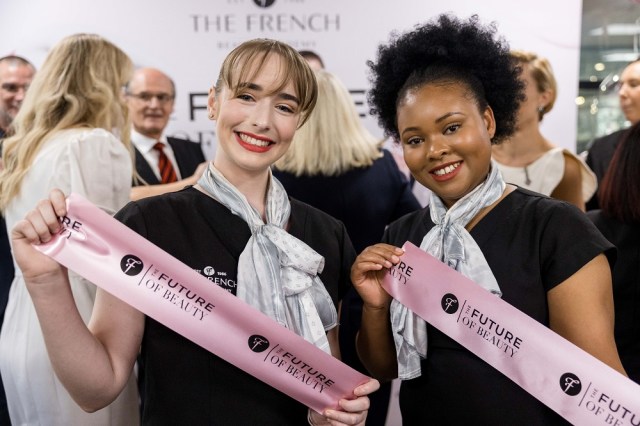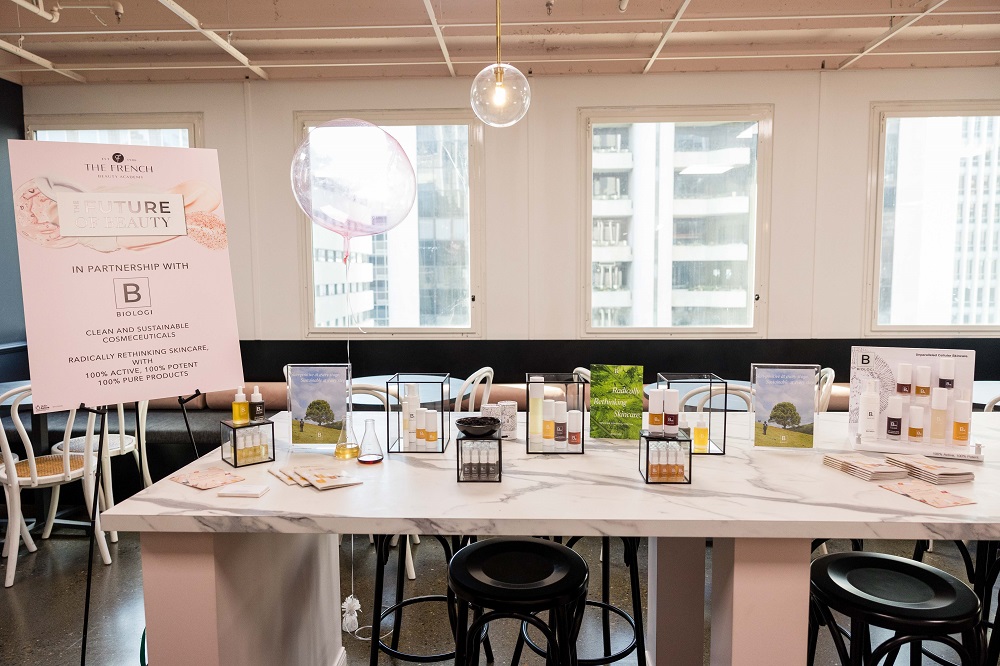Earlier this year, elite training provider The French Beauty Academy launched its Future of Beauty course. One of the course’s most unique units revolves around sustainable beauty.
While sustainability is by no means a new concept to beauty therapists or their clients, study around the relevance of this field has been less commonplace in training institutions.
Some opt to retail and work with sustainable beauty brands in-salon, yet many hold a limited understanding of the benefits of working with such brands – both on the environment and on the skin.
Hannah Gay sought to discover why this unit is being taught and what value it’s expected to bring to Australian salons:
Hannah Gay: The French Beauty Academy this year opened enrolments into its ‘Future of Beauty’ course. For how long was this course curriculum in development?
Luke French, Managing Director at The French Beauty Academy: “It’s been such an exciting time for The French, with an overwhelming response to this program. The concept for the course has been in development over the past few years through consultation with Industry. Their feedback was that the current beauty package didn’t encompass the full scope of advanced treatments required of therapists in today’s clinics.
We undertook a research project to understand the most in demand categories and treatments at a consumer level and identified how this could be integrated into the current course offerings. As a result, the ‘Future of Beauty’ program was co-developed with our academic faculty in close partnership with industry leaders, providing a more current and optimised approach to skills development that will best meet the constant industry demand.”
HG: What was the ultimate intention behind this course’s development?
LF: “There is an overwhelming demand for industry-ready graduates trained in the latest aesthetic treatments, devices and modalities, coupled with massive sector growth. At The French we’re always looking to what’s next within the beauty industry. Our commitment to excellence and thirst for revolutionising beauty career pathways was the driver in creating an industry sponsored curriculum with some of the biggest global dermal brands and technology in the world.
We want to ensure our students are fully equipped for the diverse and expanding opportunities on offer to them. This Australian industry first bridges the gap between training and employment, ensuring French graduates are skilled for the beauty jobs of tomorrow.”
HG: While there are a number of facets to this course, you have specifically enlisted units that discuss clean and sustainable beauty. Why do you believe this to be so relevant?
LF: “French students gain a highly competitive edge by having access to latest research, advanced skin knowledge and practical experience delivering advanced cosmeceutical treatments and growing consumer beauty categories such as Clean and Sustainable Beauty & Skincare, and Bi-Directional/Ingestible Beauty.
There is a growing demand and shift in consciousness from consumers to move towards products and brands that not only deliver high-performance results but those that are contributing positively to the key issues facing our environment. Consumers are also more conscious of and educated on the values they expect from their brands, from positively contributing in a social sense and reducing their environmental impact in their business practices, to placing emphasis on cruelty-free, vegan, organic and clean ingredients.
Consumers want to make better choices. At The French, we want to educate our students in not only the fundamentals of beauty therapy, but the key categories and brands that are leading the way in our industry and those that are leading with excellence and through values based business models.”

HG: There are countless sustainable beauty brands in the market. Why did you opt to work with Biologi?
LF: “Biologi has a unique evolution as a business with humble beginnings in Northern NSW, similar to that of our own history. As a brand who is leading the way in 100% active plant phyto-nutrients and is heavily invested in education and creating a more sustainable future through their business, we are proud to partner with them and bring this knowledge to how students learn about the entire sector.”
HG: What resources have/will Biologi provide to students of The French as part of this course?
LF: “All of our Official Education Partners have supported the program to co-develop and jointly deliver their relevant subjects with The French education faculty. Each Partner’s research, technology and clinical protocols are integrated into the learning materials, and students will be trained by each of the Partner’s head clinical training teams.
Students will also have hands-on access to Biologi’s products during their training which includes use of clients in-salon through our renowned Work Integrated Learning program. Biologi will also support by providing masterclasses in sustainability practices throughout our Salon Management program, critical for the longevity of business success and ultimately our environment.”
Biologi was selected as the preferred sustainable skincare brand for use in this course.
Hannah Gay: How did you come to partner with The French Beauty Academy for their ‘Future of Beauty’ course?
Lucy Kuper, Co-Founder and Managing Director at Biologi: “The French Beauty Academy has acknowledged that clean skincare and sustainability is on the rise, and want their students to be knowledgeable and educated should they wish to pursue this holistic avenue when they graduate.
We are so grateful that they approached Biologi to be a part of their ‘Future of Beauty’ flagship program, recognising Biologi as a leader in the Clean and Sustainable beauty space. This new partnership aims to fulfill rising demands in that space, ensuring our skin experts of tomorrow are at the forefront of these industry trends.
Biologi have developed specific educational content about clean beauty and sustainability designed especially for The French, as well as providing a facial and product knowledge module component. The students will also learn about Biologi in the classroom and perform a Biologi facial treatment as part of their Diploma of Beauty Therapy and Diploma of Salon Management.”

HG: Why do you believe sustainability is considered such an important unit of study when it comes to the future of beauty therapy?
LK: “Sustainability is such an important area of study because we need to ensure we are protecting our planet for ourselves and further generations. That means making a concerted effort to reduce our environmental impact, promote ethical and fair-trade practices, while also ensuring the wellbeing and safety of employees and customers.
It’s an area that needs to be studied, because even the word ‘sustainability’ can sometimes feel confusing and overwhelming (especially in an industry that is rife with greenwashing). It’s imperative that beauty professionals understand just what sustainability really means and know the difference between brands that are really doing good for the planet, and brands that are instead employing clever marketing tactics. Nowadays you really do need to know how to read between the lines when it comes to claims, do your own research, and ask questions when there are areas of ambiguity.
By the same token, brands need to be able to back up their claims, have a full understanding of supply channels (including where ingredients are sourced and how they are produced), and be transparent when it comes to any claims they are making.”
“It’s imperative that beauty professionals understand just what sustainability really means and know the difference between brands that are really doing good for the planet, and brands that are instead employing clever marketing tactics.” – Lucy Kuper.
Read about the growing prevalence of greenwashing by beauty brands here.
HG: What are some distinguishing factors about Biologi that make the brand stand out against its sustainable competitors?
LK: “Transparency would have to be one of them – we are the first to tell you exactly what is in our products, where they come from, and how they are made. We are also very open about explaining to our customers that we are not perfect when it comes to sustainability.
The truth is it is almost impossible for any brand to be 100% sustainable. However, we are continually looking at ways that we can improve, whether that be creating programs like Biologi’s Take Back Program, Powered by TerraCycle, which helps reduce any environmental impact, or looking to innovation to choose a more sustainable alternative (such as our new Sheet Masks which harness bio cellulose technology).
I think it’s really important to applaud brands who are making an effort to do their bit because the reality is, choosing a more sustainable alternative often means it’s more expensive for the brand.”

HG: Why do you believe beauty salons should consider stocking a sustainable skincare brand in its business?
LK: “These days customers are conscious of the environmental impacts that our day-to-day lives are having and are therefore making smarter choices whenever they can. They are actually looking for sustainable skincare and beauty alternatives, and I think it’s important for salons to be able to offer that to their clients. Not only is this going to be beneficial for their bottom line, but it’s good for the planet too.”
For more information on the Future of Beauty course, visit this link.
Read the current issue of our digital magazine here:
- For more news and updates, subscribe to our weekly newsletter
- Follow us on Instagram
- Like us on Facebook
- Join Australia’s largest network of beauty industry professionals on LinkedIn
- Subscribe to our print magazine
Have an idea for a story or want to see a topic covered on our site and in our pages? Get in touch at info@professionalbeauty.com.au.

